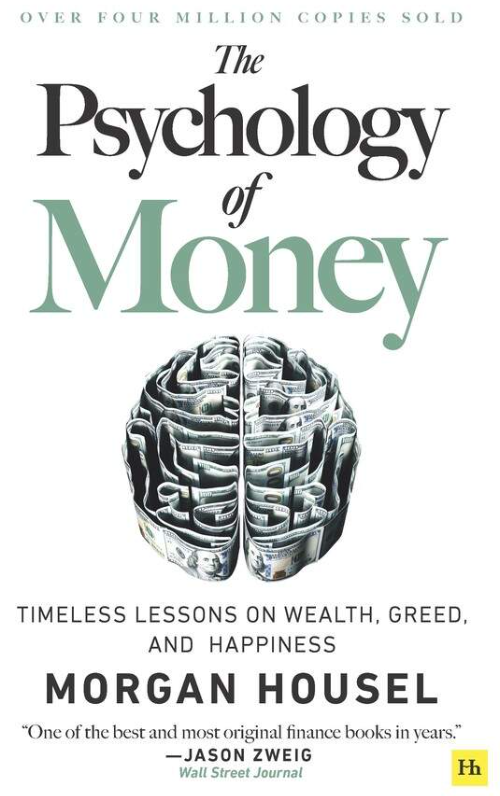The Psychology of Money: Timeless Lessons on Wealth, Greed, and Happiness written by Morgan Housel

5 most impressive ideas in this book
1. No one said that to be happy you should try to work as hard as you can to make money to buy the things you want.
My reflections:
I can’t agree more that working very hard to be able to buy whatever you want is not essential to be happy. Instead, you might feel exhausted and unhappy due to long working hours. Acquiring more material possessions is not equal to happiness. Although you will feel euphoric when purchasing a new Porsche or Hermès products, the pleasure from acquiring these luxury items is often short-lived. Furthermore, you might find yourself financially overwhelmed when using credit to buy these upscale goods, resulting in low savings or even substantial debts. Additionally, owning these materials is unlikely to bring you direct happiness. I believe people need to reconsider the purpose of working long hours to afford such luxuries. I am uncertain whether luxury items truly bring happiness, and I’m suspicious of the intentions behind their acquisition. Perhaps individuals are more inclined to showcase their money, especially by purchasing unnecessary items to impress people they don’t even like. Therefore, finding happiness in other ways is more reasonable.

2. Spending money to show people how much more you have is the fastest way to have less money. No one is impressed with your possessions as much as you are.
My reflections:
It is the fastest way to spend down your wealth unreasonably and the worst way to try to impress people by upgrading your lifestyle, whether it’s getting a new SUV, a bigger house, or purchasing luxury possessions such as a Porsche and Hermès products. What people might think is probably how they themselves feel if they are able to have an upgraded lifestyle or own those luxury items. You are the only person who is impressed by your possessions, not the people around you. If your wealth won’t be substantially affected after buying these luxury things, it’s ok to do it. However, for many other people, they mimic wealthy individuals and purchase these upscale products with their own money or by using credit to buy them. They don’t really realise that those material possessions are unlikely to bring direct happiness or fame to them, but, to be honest, more debts. Thus, being aware of your own intention to spend money on luxury items can be helpful in not spending down your money too fast or too unreasonably.

3. Building wealth has little to do with your income or investment returns, and lots to do with your savings rate. More importantly, the value of wealth is relative to what you need.
My reflections:
Gaining wealth depends much more on your regular expenses and savings rate rather than on your income or net worth of assets. You could build up your wealth more easily if you spend less than others with higher regular expenses. You will also have more wealth even if you earn less than others but save more than they do. For example, you could save $1,000 every month if you have a $3,500 income and spend $2,500 on regular expenses. People could barely increase their savings if they have a $10,000 income but spend nearly $10,000 every month on an upscale lifestyle. Similarly, your net worth, including savings, will be affected if you have high expenses every year. Your investment returns will have little to do with your wealth if you want a lot and need to spend lots of money on luxury items or services, as you might need to withdraw money from your asset or sell your assets every year to maintain your luxury lifestyle. However, spending only on necessary things could help you reduce the cost of living and keep investing money to build up your assets, such as putting money in American index funds for 10 to 20 years. Accordingly, being aware of what you buy and your own regular expenses could help you inspect your current savings rate and make a better decision to build up your wealth.

4. Avoid the extreme ends of financial planning.
My reflections:
It is important to have enough savings and insurance and not to risk investing all your money to earn high returns in a short period. Having enough money in your savings account allows you to have room for error. Even though you lose some of your money during an investment activity, you can still afford the cost of living with enough savings before you’re ready for the next investment. Furthermore, you couldn’t predict when you’ll encounter an accident. For example, one of my university classmates who had a car accident. Fixing the car would have cost nearly all her savings. Instead, she spent money on renting a car from the insurance company until she received the compensation money, which still was not enough for a new car straight away. As I later learned, she had to borrow some money here and there. However, without some savings or comprehensive car insurance, the situation could have been even worse. Avoiding engagement in suspicious high-return investments with high risks is also significant to everyone. It sounds more like a scam to me when someone persuades you to invest a large amount of money in something suspicious to earn high investment returns, like 20% in a short timeframe such as a year. Having such delusions of high investment returns in a short time is so risky, and you are unlikely to claim your money back once you realise it’s a trick.

5. Manage your money in a way that helps you sleep at night.
My reflections:
Everyone has their own way of managing money, and there are no correct answers, but it is significant to feel confident and comfortable with your chosen approach. For me, having enough savings, including emergency funds, and investing my money in a few different safe places helps me sleep well at night. Emergency funds provide a sense of security and increase my freedom of choice during difficult situations, such as the car accident that my classmate encountered. With enough savings, I don’t need to borrow money from others or spend a long time on renting a car from the insurance company. Instead, I could have the option to buy a new or second-hand car while waiting for compensation. Although life is unpredictable, having more savings provides more options.
Investing money is also important to avoid letting it sit idle in the bank earning minimal interest. I prefer stable and reasonable investments over suspicious high-return options in a short period. Long-term contributions to investments, such as index funds like the S&P500, offer the potential for positive returns over at least 20 years. Every individual has their own preferences when it comes to money management, and any safe approach is reasonable as long as it’s based on thorough research and confidence in the chosen investments. Ultimately, the right way to invest money is the one that helps you sleep better at night.
